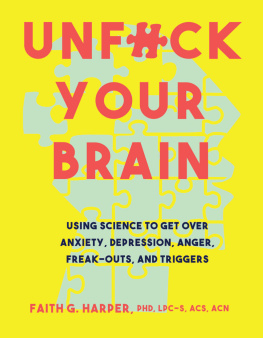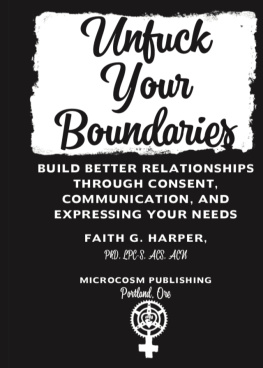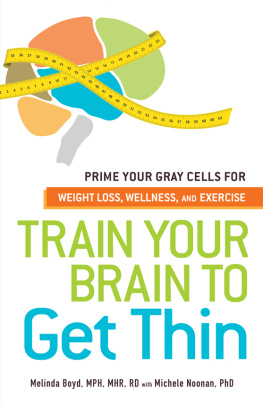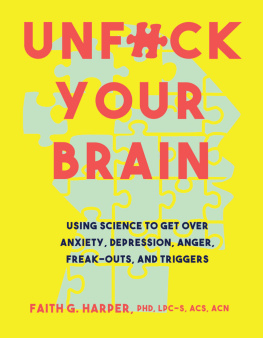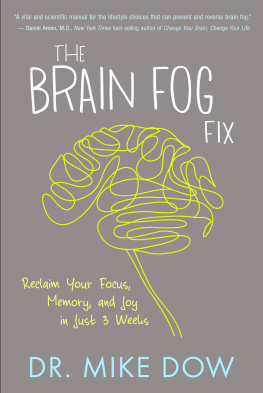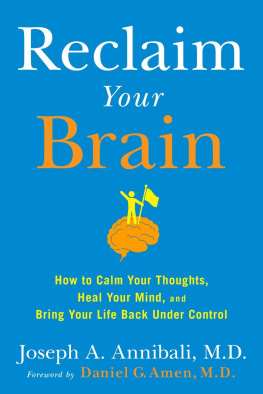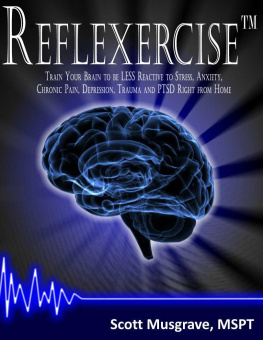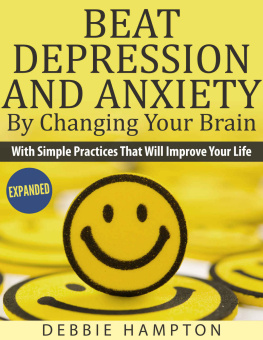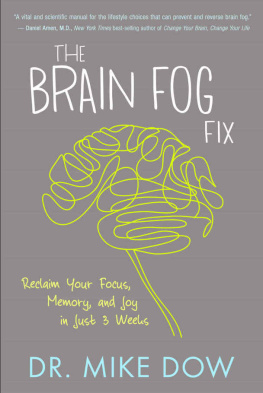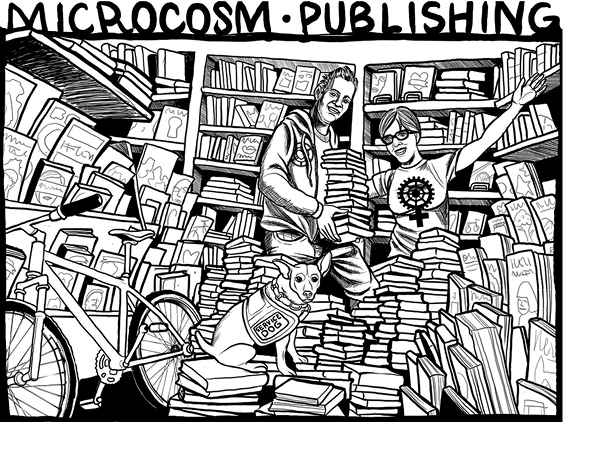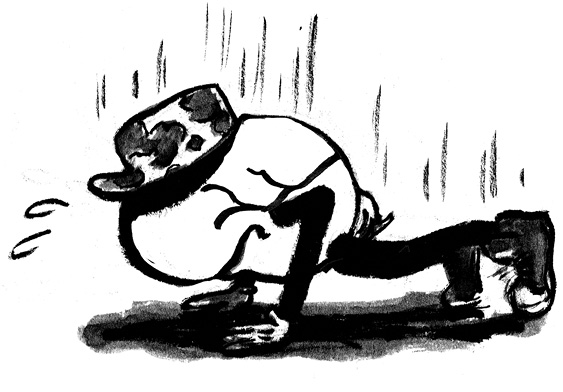BEFRIEND YOUR BRAIN
A Young Persons Guide to Dealing with Anxiety, Depression, Freak-outs, and Triggers
Part of the 5 Minute Therapy Series
Faith G Harper, 2021
This edition Microcosm Publishing, 2021
eBook ISBN 9781648410390
This is Microcosm #268
For a catalog, write or visit:
Microcosm Publishing
2752 N Williams Ave.
Portland, OR 97227
(503)799-2698
www.Microcosm.Pub/ BEFRIEND
Did you know that you can buy our books directly from us at sliding scale rates? Support a small, independent publisher and pay less than Amazons price at www. Microcosm.Pub
Microcosm Publishing is Portlands most diversified publishing house and distributor with a focus on the colorful, authentic, and empowering. Our books and zines have put your power in your hands since 1996, equipping readers to make positive changes in their lives and in the world around them. Microcosm emphasizes skill-building, showing hidden histories, and fostering creativity through challenging conventional publishing wisdom with books and bookettes about DIY skills, food, bicycling, gender, self-care, and social justice. What was once a distro and record label was started by Joe Biel in a bedroom and has become among the oldest independent publishing houses in Portland, OR. We are a politically moderate, centrist publisher in a world that has inched to the right for the past 80 years.
Contents
Preface
Introduction
Who Is This Book For?
What is Going to Happen in this Book?
Take Action: Taking Your Own Temperature
Part One: This is Your Brain on Trauma
Chapter 1: When Did My Brain Turn against Me?
Why Is My Brain a Big, Hot Mess?
Brain 101
The Annoying Amygdala
Fight, Flight, or Freeze... Its the Brainstem!
Squish It All Together? We Got Storytelling Brains
Yes, You Can Retrain Your Brain
Its Official. You Are Not Crazy. A Doctor Just Said So.
Take Action: Trigger Is Not Just Roy Rogers Horse
Chapter 2: How Trauma Rewires the Brain
Okay, Lady, What Exactly Do You Mean by Trauma?
How Our Brains Handle Trauma
What Trauma Looks Like on an Ordinary Day
Take Action: Name It
Chapter 3: Befriend Your Brain
The Fancy Science of Befriending
Dealing with Trauma Right after It Happens
Dealing with Things Way Later
Okay, So Its Not Really a Trauma. But I Still Have a Messed-Up Brain. Whats Up with That?
I Love Someone with a Serious Trauma History
Take Action: Ride the Wave
Take Action: Put It on Ice
Chapter 4: Getting Better: Retrain Your Brain
A Framework for Getting Better
Safety and Stabilization
Remembrance and Mourning
Reconnection
First Things First: Safety and Stabilization
Take Action: Create Coping Cards
Grounding Techniques
Mental Grounding
Physical Grounding
Soothing Grounding
Mindfulness Meditation
Prayer
Music
Self-Compassion Exercises
Mantras/Positive Self-Talk Strategies
Exercise
Get Yourself Outside
When Youre Ready: Remembrance and Mourning
Writing or Journaling
Telling Your Story
Reframing Your Story
Getting Back Out There: Reconnection
Use Your Story to Create Meaning
Finding Forgiveness
Building Relationships with Safe Boundaries
Chapter 5: Getting (Professional) Help: Treatment Options
Traditional Talk Therapy
Allopathic Meds
Naturopathic Meds
Other Complementary Therapies
Acupressure/Acupuncture
Biofeedback/Neurofeedback
Nutrition Changes
Natural Supports
Part 2: This is Your Brain on Life
Chapter 6: Anxiety
Symptoms of Anxiety
Do I Have Anxiety or Am I Just Anxious Sometimes?
So Where Does Anxiety Come From?
Self-Training for Learned Optimism
Take Action: Challenge Your Negative Gremlins
Chapter 7: Anger
A Culture of Anger
Anger Is a Secondary Emotion
More on Needs
Take Action: Where Does Your Anger Come From?
Chapter 8: Addiction and Unhealthy Behaviors
Where Addictions Come From
How We Heal
Abstinence-Based Treatment
Harm-Reduction
Reclaiming Our Lives
Take Action: Where Can You Say Yes?
Chapter 9: Depression
How Does the Getting Better Part Work, Then?
Activity: What I Want Back
Chapter 10: The Importance of Honoring Grief
What Is Grief?
Platitudes People Use That Dont Help (And My Responses)
Take Action: Honoring Your Own Grief Through Ceremony
Conclusion: The New Normal
Sources
preface
F irst of all, no one expected the original version of this book to be as hugely popular as it was. Im a nobody from San Antonio, Texas, and I wrote a book published by a medium-sized publisher that appeals to punks and weirdos (my people!). And it didnt get popular because Oprah found it. It got popular because those same punks and weirdos read it and passed it to their friends. Who passed it on and passed it on and passed it on. And a couple of years after it was published, it ended up on best-seller lists (which goes to show that punks and weirdos can absolutely change the world).
And I got tons and tons of fan mail. Most of it was about how helpful they found the book and how they loved that I write the same way that I talk. The other one percent hated my language and thought it was disrespectful of my academic background. I guess if I have a PhD I should sound boring and stodgy? They demanded a clean version of the book because they didnt like my language.
My publisher shrugged and said, When you try to make everyone happy you end up making no one happy. You sound like yourself, and thats what makes the book good.
Then we got a note from someone who worked with teens with significant trauma history who were also involved in the justice system. Which is a lot of crap to go through before legal adulthood. She used my books regularly, especially the original brain book, and had to black out the f-bombs. She asked if we had considered making a kid-friendly version. Not dumbing down the science or anything, but something that could be used in schools and detention centers and the like without needing to use a sharpie every other word.
So, heres the thing.
Not only do punks and weirdos change the world as a group, one person with a reasonable and respectful request can also change the world. She wasnt yelling about how I write, she just wanted to use it in places where it was really needed. I sent that email to my publisher who said, Thats totally fair, we should do it!
So this book, the kid friendly version, was officially approved.
So the next question was, do we have someone else write it, or do I do it? Of course I wanted to do it! I did not want someone else dumbing everything down. I work with a lot of teens and preteens in my private practice, and they are incredibly smart and thoughtful.
One of my biggest complaints about mental health books written for people under eighteen is that they treat readers like theyre dumb. And Ive found yall tend to be more self-aware and world-aware that most of the middle-aged people I know. And yall are the ones wholl be fixing this planet after we are long gone.
So no talking down or dumbing down of anything. No cheesy. No fake positives and cheer. Just real life science, help, and advice. Because youre already living real life, and you already have real problems.
Next page

